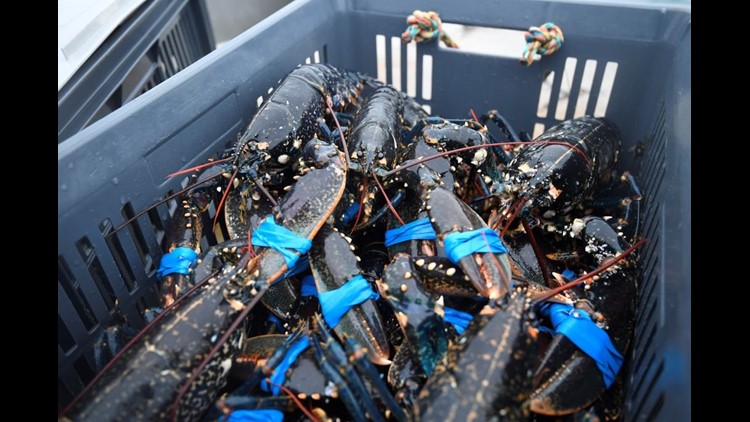CONNECTICUT, USA — Two decades after Connecticut's lobster industry collapsed, federal funding has been approved to begin removing some of the hundreds of thousands of derelict lobster traps left on the floor of the Long Island Sound, a “ghost fishery" that continues to trap and kill marine life to this day.
The $569,000 included in the new federal budget bill will finance a coalition, led by The Maritime Aquarium of Norwalk, which will oversee the retrieval of the traps. The goal is to eventually hire local charter fishing vessels and fishermen to collect an initial 3,000 traps over two years, ultimately getting rid of abandoned marine debris that has upset the Sound's food chain and becomes a source of pollution in the waters.
“These are not traps that are still being actively retrieved by fishermen. And yet, what we have learned over years of research, is that they are still traps that are actively catching different marine life," said Jason Patlis, the aquarium's president and CEO. "There’s not much lobster to be had, but there are crustaceans that are finding their way into the traps. There’s finfish that find their way into the traps.”
The effort to remove the old lobster traps in Connecticut waters is similar to the one taken in the New York waters of Long Island Sound. Since 2011, the Cornell Cooperative Extension of Suffolk County has removed 19,000 abandoned traps — about 91% were still functioning. About a third of those were found to have live crabs, fish and lobsters, including pregnant females, often attracted by other animals that had died inside the trap, said Scott Curatolo-Wagemann, a senior educator at the agency.
A similar effort to remove 9% of the “ghost” lobster traps from the Chesapeake Bay led to an increase in fisheries by thousands of metric tons, said David Hudson, a researcher in residence at Norwalk aquarium. He predicted that removing the old traps will help the populations of various fish species including tautog, rock crabs, whelk, cunner and sea bass, as well as the remaining lobsters.
It's been estimated that about one million lobster traps have been left behind in Long Island Sound, either lost accidentally over the years or abandoned after the region's $12 million lobster industry crashed in 1999, fueled in part by a massive die-off of lobsters, Curatolo-Wagemann said.
The Cornell cooperative extension service has since worked with the commercial fishing industry to track down and pull up the old traps — and approach Connecticut now plans to follow as well.
“The guys who had stayed in it, most of the guys we’re working with are multi-generational fishermen. A lot of them are in their 70s. And they were full-time lobstermen at one point,” Curatolo-Wagemann said. “They kind of knew over the years where different guys had fished their traps. So their knowledge has been invaluable to us being able to locate these things.”
In Connecticut, the aquarium in Norwalk will be working with Save the Sound, the Long Island Soundkeeper, Project Oceanology in Groton and the New York cooperative extension service to start up the new removal operation for Connecticut's portion of the 1,320-square-mile (3,420-square-kilometer) estuary. Funds from the federal budget bill, secured by the state's congressional delegation, will be used to operate vessels, pay lobstermen to remove old traps and other expenses.
Bill Lucy, the Long Island Soundkeeper and a former commercial harvester, said he's ready to coordinate the lobster trap removal trips, research activities and workshops with local lobstermen, as well as help return tagged derelict lobster traps back to their original owners. Those traps with no markings or that go unclaimed will be recycled.
“Save the Sound is looking forward to working with the fishing fleet to start clearing these lost traps and reducing this hazard to marine life,” he said in a statement.
RELATED: Pending approval, state allocates $1.3 million in funding for New London innovation workspace
Old lobster traps will be removed from every coastal community along the Connecticut shoreline. Sixty outings are planned over the next two years, likely beginning sometime this fall. Copps Island Oysters in Norwalk and Indian River Shellfish in the Madison and Clinton area have already agreed to retrieve the old lobster traps. Others in the industry will have the opportunity to apply.
----
Have a story idea or something on your mind you want to share? We want to hear from you! Email us at newstips@fox61.com
----
HERE ARE MORE WAYS TO GET FOX61 NEWS
Download the FOX61 News APP
iTunes: Click here to download
Google Play: Click here to download
Stream Live on ROKU: Add the channel from the ROKU store or by searching FOX61.
Steam Live on FIRE TV: Search ‘FOX61’ and click ‘Get’ to download.



